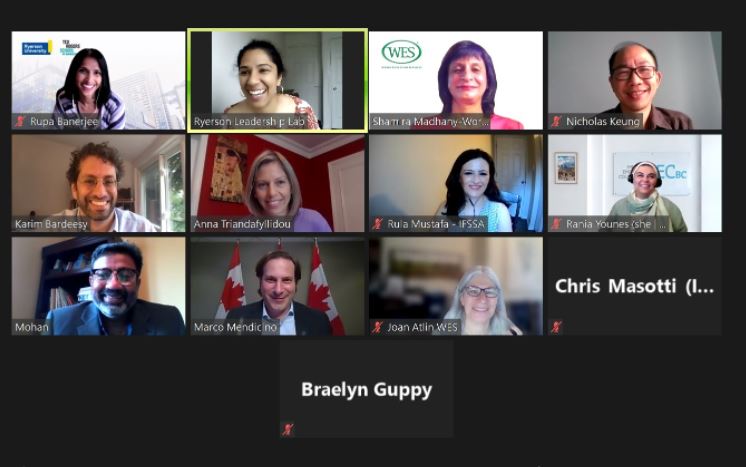Immigration Minister Marco Mendicino has emphasized the need to modernize Canada’s immigration system so that future public health crises don’t threaten the economy the way COVID-19 has, though he was scant on details about how to achieve it.
Speaking at an online event on Friday organized by First Policy Response, Mendicino said bringing immigrants into the country is critical for the Canadian economy, while also recognizing the “contributions (of immigrants) that we took for granted before the pandemic.”
“We believe that we are an open country, an inclusive country, but our system needs to be transformed, needs to be modernized, so that it can accommodate the great demands that are placed on it,” he said.
Mendicino believes the $1 billion slated in the 2021 budget to “modernize and transform” the immigration system will lead “not only to better service…but to faster outcomes” for people trying to immigrate into the country. As he sees it, it is part of a “shift in the paradigm in the way we talk about immigration,” which should include getting rid of discriminatory practices like “ranking immigrants one against the other” – namely those considered low-skill versus those with higher qualifications.
“I think the pandemic has allowed us to really understand that each and every newcomer has something to contribute to our economy, to our communities and to our country,” the Minister said.
The government has taken some steps during the pandemic to continue some level of immigration. These have included writing new laws and policies to authorize entry based on “the needs of the economy;” the digitization of permanent residence and citizenship application processes; and the extension of permanent residence to immigrants already working in the country but lacking status through programs like the Essential Workers Pathway and the Guardian Angel programs, the latter of which allowed “asylum seekers to stay in Canada thanks to their contributions in hospitals and long-term care homes,” Mendicino said.
“We prioritized the needs of the economy. Immigration will create jobs, further opportunities and strengthen our long-term prosperity.”
“Survival jobs”
But other than “investing in hiring additional people, introducing new technologies and putting in place policy flexibility,” there were few, if any, details on what will be done going forward to ensure immigrants don’t fall into precarious employment. Raju Mohandoss, one of the four panelists and the director of newcomer programs and services at WoodGreen Community Services, a settlement organization in Toronto, referred to these employments as “survival jobs.”
“When newcomers come – even qualified ones – they get into survival jobs that sustain them during a period when they are putting other things together and trying to access other services to integrate,” he said after the Minister had finished speaking and left. “But all these survival jobs are in the hospitality, retail, or manufacturing sectors…all of which are completely wiped out because of the pandemic situation.”
To his credit, before leaving, Mendicino had mentioned the importance of “making sure we protect (migrant workers’) rights” and “ensure that their workplaces are safe and healthy,” but he again failed to specify how this would be done.
He also made no mention of the precarious nature of most of those so-called “survival jobs.” And while he recognized that speaking of immigration must include a discussion on how to “attract people not only for the purposes of adding to our economy…but to protect that promise of Canada” as a welcoming, safe country, he gave no details on what will happen to people whose permanent residence applications are stuck in limbo or in a backlog, other than “keep the faith” and “we hear you.”
“Two-tier system”
The four-member panel that followed Mendicino’s presentation, which consisted of immigration experts from various fields, failed to find the Minister’s announcement as much more than a self-congratulatory moment.
“I didn’t hear any reflection about the political direction of where this is going beyond the celebratory,” said Anna Triandafyllidou, the Canada Excellence Research Chair (CERC) on Migration and Integration at Ryerson University and editor-in-chief of the Journal of Immigrant and Refugee Studies.
Rupa Banerjee is the Canada Research Chair and Associate Professor at the Ted Rogers School of Management at Ryerson. She said that while she agreed with Mendicino that “a lot of news early in the pandemic really [was] quicker” than what is expected from governments, little work has been done to help newcomers integrate into society.
Mendicino “talked about selection and modernization,” she said, “but, at the end of the day, those do not exist in a vacuum…Newcomers face challenges once they arrive in Canada, and those challenges need to be integrated into the selection system as well.”
What is needed immediately in order to help newcomers, added Mohandoss, are dollars. While the $1 billion investment is “good to hear,” Mohandoss stressed that “no new dollars” have been made available for settlement agencies, which are crucial in helping newcomers find, understand and access available resources. According to him, there hasn’t been any investment in the settlement agencies sector for “more than a decade and a half.”
“We have these targets – that’s great – but what happens to (newcomers) when they’re here?” he said. “Unless we’re improving settlement services, these people are going to continue to struggle being here…So, dollar investments in digitizing and innovating stops short of investing in settlement services.”
Much of the rest of the conversation between the panelists involved discussing what they saw as Canada’s “two-tier immigration system,” referring to the premium the government puts on the Canadian Experience Class versus so-called “low-skill” immigrants. The result, said Shamira Madhany, World Education Services’ managing director, is that Canada ends up “with a lot of people who come to Canada through the two-tiered system but don’t grow our economy” as their experience abroad is discounted and thus often goes underutilized, forcing them onto precarious so-called survival jobs.
“Even with pathways to permanent residence, people still struggle greatly after transition,” added Banerjee.
Madhany suggested a three-pronged approach to help boost the economy by properly utilizing newcomers’ experiences and skills as they integrate without having to sacrifice their safety: a national strategy to enhance immigration and labour market integration; policies that are intentionally passed with those who are “impacted greatly” in mind, such as racialized women and people relegated to low-wage labour; and developing innovative tools and approaches to recognize and assess skills and experience gained abroad.
“We need to think about being intentional about leveraging the skills people bring,” she said. “This isn’t just about bringing people in and taking any job…but using people’s deep experience.”
Fernando Arce is a Toronto-based independent journalist originally from Ecuador. He is a co-founder and editor of The Grind, a free local news and arts print publication, as well as an NCM-CAJ member and mentor. He writes in English and Spanish, and has reported from various locations across Canada, Ecuador and Venezuela. While his work in journalism is dedicated to democratizing information and making it accessible across the board, he spends most of his free time hiking with his three huskies: Aquiles, Picasso and Iris. He has a BA in Political Science from York University and an MA in Journalism from Western University.





